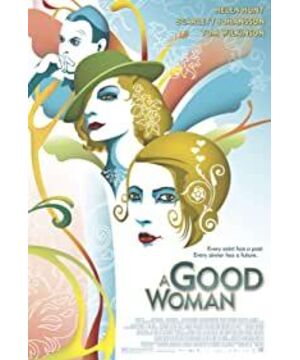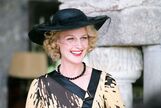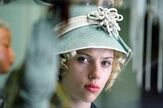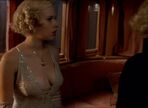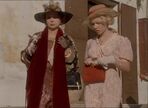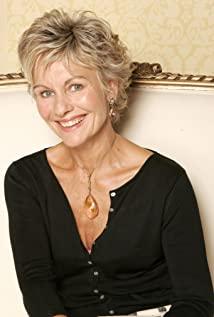First, Mr. Wen's image and his attitude towards Mrs. Ou. In the original work, Mr. Wen has always been a defender of moral boundaries and the rules of high society. Corresponding to this is his strong "protector" image: at the beginning, he believed that Mrs. Ou was at least frank and honest, and she was willing to help change her material life, even disregarding the objection of his wife, insisting that such a notorious woman introduces home evening. He was extremely tough in this scene, almost completely ignoring his wife's feelings. At the same time, he often refers to Mrs. Wen as "my child", which is also a logo. He maintains his wife to protect her "purity", so much so that after he thinks Mrs. Ou is hopeless, he cannot tolerate her touching his wife's fan.
In the movie, Mr. Wen's moral color is greatly weakened. One of the most obvious differences was that he complied with his wife's wishes and refused Mrs. Ou to appear at the house party. This is the exact opposite of the original attitude. The soft and struggling words he said to the angry Mrs. Wen through the door at the end of the party were a low profile that Mr. Wen in the original novel was unlikely to say. "Love" became the starting point of this character. But it is worth pondering that at the beginning of the film, Mrs. Ou used her charm to talk to Mr. Wen, get into his car, and lead him into her room. Mr. Wen didn't really do anything, because it was presumed that Mrs. Ou then revealed her identity to him. But the film allowed him to be tempted to this point, which inevitably raised doubts about "love" from the very beginning.
Related to this is Mrs. Win's performance: after entering Lord Darlington's room, Mrs. Win's mind wandered from side to side. Wilde makes her struggle and decide to go back (that is, using a genuine moral instinct to undo her emotional decision to cheat on her cheating husband), and Mrs. Ou appears; the film makes her go in the opposite direction: she thinks it is Lord Da Now, although still apprehensive, she hurriedly assumed a bohemian pose she understood: she went further and further down this road. The original book praised Mrs. Wen as "sensible" and "common sense" through Dumby's words. Although Dumby praised her for "reasonably" letting her husband's mistress come to her door, she actually just praised her true characteristics. This Mrs. Wen has moral judgment and can make moral choices. Looking at her husband's checkbook is also a move she knows she shouldn't but still decides to make. This feature is weakened in the film. Mrs. Wen accidentally turned to the checkbook because of Lord Da's design; and her performance in Lord Da's room was also like a little girl without judgment, letting her emotions take her away. , if Mrs. Ou hadn't come in, she would have really embarked on the road of revenge for cheating with cheating.
These two are probably the most important adaptations, because they almost completely change the object of the critique: Wilde's critique of the line between good and bad in morality and the high-society morality associated with it. In the film, morality regresses to Mrs. Wen's unseen and unseen knowledge (heard a lot of gossip); what really dominates her is her emotions. Mr. Wen had such a clear moral image in the original book, and in the movie he became the husband who loved his wife. The plot that he could not withstand the temptation of Mrs. Ou at the beginning completely excluded him from the moral discussion. So the theme of the movie becomes whether love is as steadfast as he claims to be in Mr. Wen, and in Mrs. Wen... It seems that there is no discussion, just to show that she either loves very much, or completely throws herself out after love turns into resentment , morality has no place in fact.
Therefore, Lord Zhongda in the original book later praised the woman he loves as "the only real good woman I have ever seen", which indeed applies to Mrs. Wen, who has moral judgment and restraint, and his love seems to be somewhat sincere; and in the movie Lord Da seemed to be really just an international playboy seducing the beautiful Lady Wen.
An adaptation of Mrs. Ou has something to do with it. Out of family affection, she safeguarded the reputation of her daughter, Mrs. Wen, but sacrificed her future marriage to the rich old man, Mrs. Ao. When Wilde told her to just leave the Wen family's door, he made up a story to coax Lord Ao, who immediately decided to marry her again. In this regard, Mr. Wen sarcastically said that Mrs. Ou is really "extremely smart"; Mrs. Wen made a moral judgment of "a good woman" to Mrs. Ou, although Mrs. Ou's motives and methods of marriage were not moral, and they were simply in harmony with Mrs. Ou. Her noble behavior towards Mrs. Wen was a complete reversal. In the film, Mrs. Wen made up a story to deceive Mrs. Ou, so Mrs. Ou had moved tears in her eyes. It seemed that she would really be a good woman from now on. Wilde described a "smart" woman who made a moral sacrifice out of a "momentary awakening", and immediately won herself a bright future in the upper class with her cleverness and charm; She is a woman who wants to reform after a spiritual baptism, and her future comes from Mrs. Wen's return. Her moral controversy was resolved through this "awakening" and "salvation", and the "smart" confrontation with morality also disappeared. This is a good story that everyone loves to hear.
Mrs. Ou's "heart awakening" came from the resonance of Mrs. Wen's destiny. Maternal love may have some role in it, but what triggered her transformation was the discovery that Mrs. Wen was about to embark on the same path as her (although Mrs. Wen later held it herself), which aroused her feelings of pain for the past twenty years. Feeling that the same thing happened to the mother and daughter one after another was her "real punishment" (the word "redemption" came later, and Mrs. Ou actually had a strong moral judgment). Mr. Wen believes that maternal love is all about "devotion, unselfishness, sacrifice". Mrs. Ou felt this more complex and profound fate echo between mother and daughter, which deepened the meaning of maternal love, resulting in a more complex and profound "sacrifice" and a twist of fate. Based on this, Mrs. Ou repeatedly warned her daughter to guard your child and not let his life be ruined by you. It was her admonition, and her confession, - but Wilde did not make her repent by her confession.
Mrs. Wen has a child in the original book, but not in the movie. This child adds to her similarity to Mrs. Ou's fate, and makes her, as a mother, reach out to her mother like a child and say: take me home, take me home. Wilde sings praises to his mother here to a very high degree. Mrs. Wen has always lived in pure nostalgia for her mother. The only time in her life that she forgot her mother and made a "stupid and bad" decision. And for the only time in her life that Mrs. Ou felt like a mother, she made self-sacrifice. The mother became the source of morality.
In the movie, because of the abolition of morality, maternal love becomes a pure emotion, just like the discussion of love between the Wen family. Emotionally inflated without morality, while slightly questioning romance (love), this is probably a fairly modern adaptation (does it fit the 1930's American setting?). At the same time, Mrs. Wen's independent moral judgment and Mrs. Ou's independent "smart" disappeared, which made us more "modern" feel slightly uncomfortable.
(I read the original script immediately after watching the movie once. Only once, so there is probably something inappropriate. Also, there are many issues in the original to discuss, Wilde is a serious person)
View more about A Good Woman reviews


